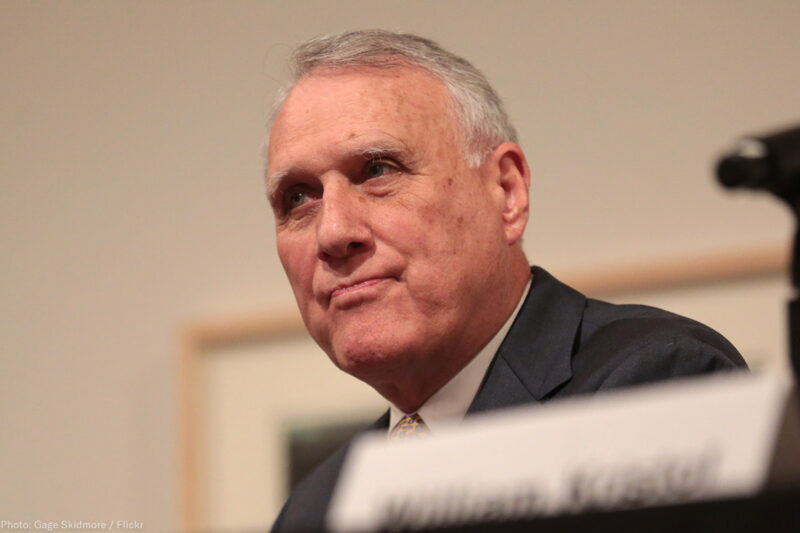
On Wednesday, Vice President Mike Pence swore in Jon Kyl as the new senator from Arizona, replacing the late John McCain.
Kyl previously served in the Senate from 1995 and 2013, where he built up a clear record of opposition to civil liberties, proposing to make the Patriot Act permanent and supporting amendments to the Constitution to undermine free expression, equal protection, and due process.
He more recently developed close ties to the Trump administration, helping advance the nomination of Jeff Sessions for attorney general and the Supreme Court nomination of Brett Kavanaugh.
Now that he has returned to the Senate, we expect that Kyl will once again push a platform that undermines civil liberties and civil rights.
Undermining privacy rights
Kyl proposed an expansion of the Patriot Act of 2001 just three years after its passage that would have repealed its sunset clauses and effectively made the sweeping and unconstitutional law permanent.
While this measure failed, Kyl did win an amendment to greatly expand the government’s secret surveillance powers, and he later succeeded in granting the government vast authority to collect the DNA of any person arrested or detained by federal agents for any reason — a clear threat to privacy.
Hostility to due process
Kyl was a cosponsor of a proposed “Victims’ Rights Amendment” to the Constitution which, had it been ratified, would have turned the longstanding principle of innocent until proven guilty on its head by weakening the rights of criminal defendants.
He also opposed an amendment to the National Defense Authorization Act for Fiscal Year 2012 that would have provided some protections against the indefinite detention of people without charge or trial.
Opposition to LGBT rights
Across the board, Kyl voted against nearly every measure to advance LGBT equality — the repeal of the “don’t ask, don’t tell” policy in the military, the Shepard-Byrd Hate Crimes Prevention Act, and protections for LGBT people in the Violence Against Women Act. He supported attempts to undermine LGBT equality, including the Federal Marriage Amendment, which would have amended the Constitution to forever ban same-sex couples from marrying, and the unconstitutional Defense of Marriage Act.
Opposition to women’s reproductive freedoms
Kyl is a staunch opponent of abortion rights and received national attention for his deceptive criticism of Planned Parenthood. After Kyl made the patently false claim that abortion services compose “well over 90 percent of what Planned Parenthood does,” his office notoriously attempted to correct his remark by saying it was “not intended to be a factual statement.”
In 2009, Kyl introduced a failed amendment to prevent the government from requiring insurance plans to cover benefits, such as maternity care, remarking that as a man, “I don’t need maternity care.”
Voted against free expression
Kyl supported an amendment to the Constitution to ban the desecration of the flag, a direct attack on Americans’ freedom of speech. The amendment was just one vote short of reaching the two-thirds majority needed for Senate approval.
Voted against disability rights
Despite bipartisan support for the United Nations’ Convention on the Rights of Persons with Disabilities, Kyl opposed ratification of the landmark disability rights treaty, joining 37 other Republicans in defeating it. The vote took place with former Senate Majority Leader Bob Dole, a disabled WWII veteran, sitting in his wheelchair in the Senate chamber while Kyl and others rejected Dole’s appeal for disability rights protections.
Voted against rights for Dreamers
Kyl voted against two versions of the Dream Act in both 2007 and 2010, and he dismissed the need to grant Dreamers a path to citizenship because, he said, they could simply find a U.S. citizen to marry.
Kyl’s record on undermining civil liberties is unmistakably clear. Instead of serving as a check on the administration’s unconstitutional impulses, as members of Congress should, he is more likely to support attacks on civil liberties than stand up for constitutional rights.
Stay informed
Sign up to be the first to hear about how to take action.
By completing this form, I agree to receive occasional emails per the terms of the ACLU's privacy statement.
By completing this form, I agree to receive occasional emails per the terms of the ACLU's privacy statement.

